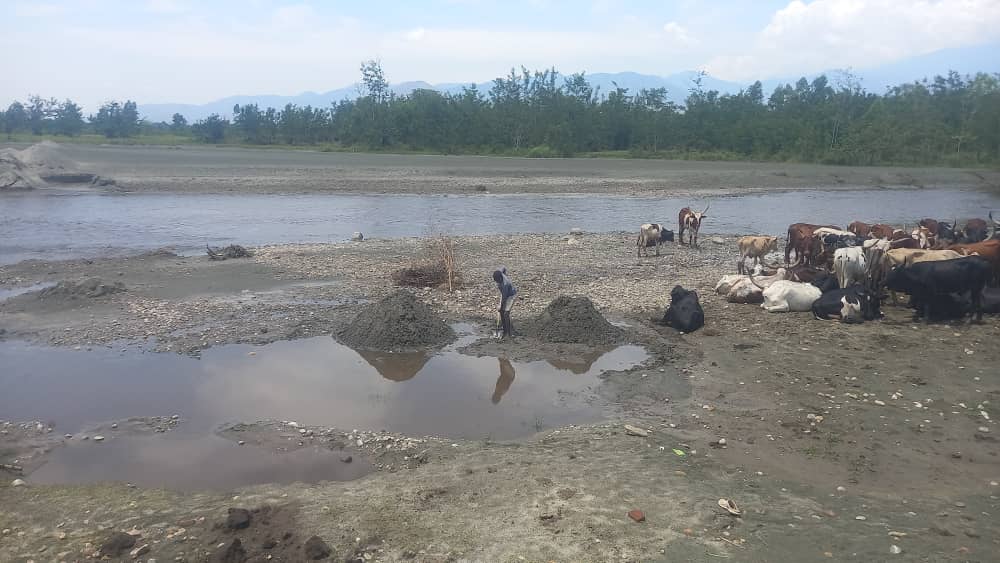KASESE -As sand mining activities continue to thrive in Kasese district unregulated, the major rivers, the natural flow of rivers like Nyamwamba, Nyamugasana, Mubuku, and Rwembyo, is being affected due to silting of the river beds.
The rise in sand mining in areas like Kasese Municipality is attributed to population growth and fast urbanization that have created the need for more housing as people move from rural to urban centres in search of jobs and better life[Rural-urban migration].
Kasese district is now grappling with the effects of climate change, partly caused by illegal sand mining that has seen some rivers dry up and nearby river banks; including wetlands, destroyed.
According to sand miners, sand mining is their only source of livelihood. A trip of sand costs between Shs 15,000 and Shs 20, 000. However, the activity is putting the lives of many residents who depend on the rivers in danger, as they use the water from the rivers in their homes.
Worse still, some of the sand miners use the rivers and nearby bushes to ease themselves, creating a public health problem as diseases like diarrhea and cholera could strike.
Samuel Kule, a casual labourer at the sand mining site on River Nyamwamba in Kanyangeya Ward, Nyamwamba Division in Kasese municipality said sand mining is his only source of income.
“I have done this job for several years and it is where I get money to sustain my family. I did not go to school and I don’t have any other job,” he said.
The Kasese Municipal Senior Environment Officer, Evelyn Muhindo Mugume, in 2015 banned sand mining. However, nothing has since changed.
Mugume argues that enforcing the ban has been difficult as people need sand to build houses and other facilities.
“We have not been able to gazette an area for sand mining, but also we are unable to enforce the law on illegal sand mining,” she said, adding that the informal sector is hard to monitor.
“People who participate in sand mining don’t have associations that bring them together which makes it hard for my office to round them up because they are not regular taxpayers and don’t have an office,” she said.
The Kasese district LCV Chairperson, Elphazi Muhindi Bukombi, said the illegal sand miners are endangering water bodies, and wetlands, among other natural resources.
“The people who are doing this want to earn a living. We have advised them to look for alternative sources of income such as beekeeping and tree planting,” he said.
Muhindi said if the sand miners keep desilting the river, the banks will be destroyed.
Muhindi said the district and the Ministry of Water and Environment alongside other partners are planting bamboo trees along river banks, urging communities to carry out activities more than 200 metres away from the river banks.
“I strongly condemn mining of sand from the major rivers across the district because the activity is illegal and is degrading the environment and destroying the major sources of water for people,” he said.
He said as a district, they will identify specific river stretches and plant there trees to cover the rivers in the future, as currently, they have been exposed to the hot sun by the illegal sand mining, leading to faster evaporation.
Unregulated mining of large volumes of sand in rivers leads to their erosion and shrinking of river banks.
It also destabilizes the ground and causes the failure of bridges, channels, and roads.
Brian Guma, the team leader at Albertine Water Management Zone under the Ministry of Water and Environment, said they are partnering with Natural Resources Defence Initiative [NRDI], Worldwide Fund for Nature, and Mubuku Integrated Farmers Association to conserve River Nyamwamba.
“All the interventions on River Nyamwamba are aimed at reducing the impacts of floods,” he said.
According to Guma, the study to ascertain the quantity of silt underneath is recommended, adding that the line ministry is in preparations to do the work.
The project manager NRDI, Ben Mwalhuma, said they are supporting communities around the river to restore degraded hills through tree planting, beekeeping, and providing families with energy-saving stoves.
Thousands of people in the district have previously been displaced and properties destroyed after rivers burst their banks. The resultant floods also damaged schools, health facilities, and roads.
The law
In 2021, the government of Uganda considered gazetting sand and murram as minerals following an upsurge in commercial mining activities across the country.
According to Article 244 [3] of the Uganda Constitution, murram, sand, or stones used for building are not subject to mining laws and regulations.
However, the Ministry of Energy and Mineral development wants this changed by enacting clause 122 [2&4].
Buy your copy of thecooperator magazine from one of our country- wide vending points or an e-copy on emag.thecooperator.news
